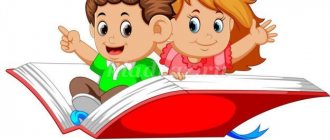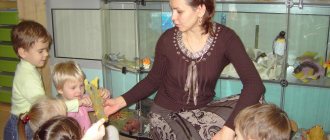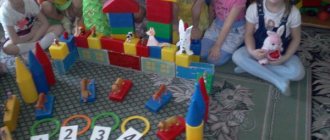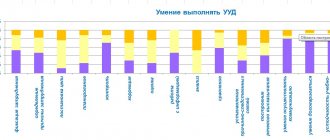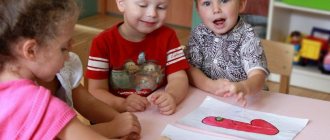Children with congenital or acquired health pathologies are limited in communication with normally developing peers. In most cases, they see in their environment only parents, medical workers and children with similar health problems (in cases where the child grows up in a boarding school or studies in correctional institutions). To solve emerging problems, various pedagogical and psychological means of socialization of children with disabilities have been developed.
Goals and objectives
Children with disabilities belong to a vulnerable category of citizens who require not only constant assistance and control from third parties, but also state social services. Social development of children with disabilities is a set of actions and activities aimed at:
- successful development of personal qualities;
- mastering accepted norms of morality and ethics;
- acceptance of established patterns of behavior in society;
- development of cognitive activity, love of learning and work.
Thus, the main goal of socialization of children with disabilities is painless adaptation to the society around them.
Objectives of socialization of children with disabilities:
- natural tasks - in accordance with age, the child must have a certain level of mental, physical and sexual development.
- cultural tasks - growing up, a teenager with disabilities must be able to communicate with healthy people, find the right topics for conversation, and take an active part in the life of society;
- psychological tasks – providing assistance in overcoming psychological barriers that have arisen as a result of an existing illness.
Practical research shows that in most cases, when meeting new people, children with disabilities try to hide their pathology. In cases where this is impossible, they isolate themselves from society or react aggressively to sympathy and overprotection from new acquaintances. Successful socialization of children with disabilities is possible only when society is ready to “accept” a disabled person. In cases where a child with disabilities does not stand out from the general crowd (for example, he plays on the playground with healthy peers), he adapts better and quickly finds a “common language” with the world around him.
Conditions for the socialization of children with disabilities:
- individual approach to education;
- parents must not only take care of their special child, but also provide him with a decent and high-quality education;
- the choice of an educational institution should depend not only on the decision of the PMPK, but also on the desires and capabilities of the child (the learning process can be carried out at home, boarding schools, correctional institutions, in correctional classes based on a comprehensive school);
- comprehensive development;
- regular visits to a psychologist, speech pathologist and other necessary specialists;
- gradual integration into society.
Parents are obliged to provide all possible assistance to their child so that his adult life is successful, fulfilling and happy. By observing the conditions for successful socialization of children with disabilities, even in the most severe cases, disabled people begin to demonstrate communication skills and learn about the world around them.
Socialization of children with disabilities. Stages and tasks. Speech at the methodological association. material on the topic
“Socialization of children with disabilities. Stages and tasks."
Socialization of children with disabilities. Stages and tasks.
Socialization is the process and result of an individual’s assimilation and active reproduction of social experience (norms, skills, stereotypes, attitudes, forms of behavior and communication accepted in society). Primary socialization, which lays the foundation for all subsequent human functioning, occurs in the family.
One of the main goals of socialization is adaptation, adaptation of a person to social reality.
The process of socialization is a process of interaction between the individual and society. This interaction includes, on the one hand, a way of transmitting social experience to an individual, a way of including it in the system of social relations, and, on the other hand, a process of personal change.
If the most significant tasks of socialization are not solved at a certain age stage, this leads to inhibition of personality development, which can subsequently manifest itself in outwardly unmotivated behavior.
The stages of socialization correspond to the age periodization of a person’s life.
For each age or stage of socialization, three groups of tasks are distinguished; solving these problems is an objective necessity for human development:
Natural-cultural tasks are the achievement at each age stage of a certain level of physical and sexual development. This level is of a specific historical nature (different nations have different ideas about the ideals of masculinity and femininity, different rates of puberty)
Socio-cultural tasks - cognitive, moral, value-semantic. At each stage of socialization, a person must have not only a certain amount of knowledge, skills, and abilities, but also take an appropriate part in the life of society. These tasks will be objectively determined by society as a whole, its level of development, regional and immediate environment of a person.
Social and psychological tasks are the formation of a person’s self-awareness, his self-determination in current life and in the future, self-realization and self-affirmation. Of course, for each stage of socialization the content of the tasks and the means of their implementation are different.
According to A.V. Mudrik, if any group of tasks or essential tasks of any group remain unresolved at a particular age stage, then this either delays a person’s development or makes him incomplete.
Social conditions for personality development:
- Psychological climate of the family, family upbringing, conditions for the upbringing and development of a child outside the family (kindergarten, school, street, peers, etc.)
- Contact with peers, assimilation of experience, formation of motivation - encouraging the mother to participate in the development process.
Modern conditions of socialization of children with disabilities:
- the relevance of the problem of interaction between authorities and various types of institutions, public organizations on the issue of socialization and integration of children with disabilities into society”;
- development and education of children with disabilities through additional education institutions;
- scientific and methodological support for the development of professional competence of additional education teachers working with children with disabilities;
- forms of interaction with parents of children with disabilities;
- the capabilities of comprehensive social service centers for the population in providing rehabilitation services to minors with disabilities;
- integration of children with disabilities into the environment of healthier peers;
- features of the work of a public organization in searching for possible social partners.
Social integration - social adaptation in the general system of social relations and interaction, the use of social benefits and privileges, taking into account the needs of the individual.
L.S. Vygodsky was one of the first to substantiate the idea of integration.
Social adaptation is an active adaptation to the conditions of the social environment through the assimilation and acceptance of goals, values, norms and styles of behavior in society; formation of individual and group behavior of abnormal children in accordance with the system of social norms and values.
Forms of adaptation:
- Biological (to environmental conditions).
- Sensory (sense organs to stimuli).
- Psychological (adaptation of a person as an individual existing in society in accordance with social requirements).
- Social.
For this purpose, integration methods are used, which can also be divided into forms:
- Psychological - achieved through a compensator. combining disparate HMFs to perform a psychologist. activities. The defect usually causes psychological disintegration with disruption of connections between different HMFs. In particular, emotionally rich, interesting activities, carried out in a playful way and guided by a psychologist, allow for the integration of HMF disorders.
- Pedagogical - the unification of an abnormal child with normal children in the process of education and training, in which he does not feel isolated in the team and adequately participates in joint activities. The house is also actively used. training and education, as well as the creation of special classes in general education institutions. This allows you not to isolate yourself from the team, family, or normal peers.
integration into society of a person with special educational needs and limited. work. ability today means the process and result of providing him with rights and real opportunities to participate in all types and forms of social. life on an equal basis and together with other members of society.
In the education system, integration means the possibility of a minimally restrictive alternative for persons with special educational needs: receiving education in a special (correctional) educational institution.
Integration is based on the concept of “normalization,” which is based on the idea that the life and everyday life of people with disabilities should be as close as possible to the conditions and lifestyle of the society in which they live. In relation to children, this means the following:
- A child with a special image. needs are also common to all, the main of which is the need for love and an environment that stimulates development.
- The child should lead a life that is as close to normal as possible.
- All children can learn, which means they should all be given the opportunity to receive an education.
The principles of “normalization” today are enshrined in a number of international legal acts: the Declaration of the Rights of the Child, the Declaration on the Rights of Persons with Disabilities in Intellectual Development, and the Declaration on the Rights of Persons with Disabilities.
Conclusion: the acceptance of integration by the population, by each person, is a long process of educating the entire society. This is the cultivation from early childhood of a new generation for whom integration will become part of their worldview.
The key point of this point of view should be the conviction that people with disabilities do not fail to adapt to the rules and conditions of society, but are included in its life on their own terms, which society understands and takes into account
Social integration of children with disabilities is a purposeful process of transferring social experience by society, taking into account the characteristics and needs of various categories of these children, with their active participation and provision of adequate conditions for this, as a result of which children are included in all social systems intended for healthy children, active participation in the main directions of life and activities of society, preparation for a full adult life, the most complete self-realization and disclosure of their personality.
Pedagogical integration involves the formation in children with disabilities of the ability to master educational material determined by the general curriculum (joint education in the same school or in the same class).
The main forms of integrated education are special classes in a general education school and joint education in one class. Special classes can be created for a specific category of children (for example, with hearing impairment, vision impairment, mental retardation, mental retardation, etc.) or combine different categories of children with developmental disabilities (for example, with mental retardation and mental retardation, complex complex violation, etc.). Co-education in the same class is more effective for children with minor developmental disabilities (for example, visually impaired, hearing impaired, mild cerebral palsy, etc.) if there is a well-established student support service at school.
At the same time, the number of children with disabilities studying in a regular class, as a rule, should not exceed 3-4 people. With inclusive education, it is necessary to provide comprehensive psychological and pedagogical support for a child with disabilities.
An important component of successful inclusive education of a child with disabilities among healthy peers is preparing the environment for the integrated process through training programs for advanced training for specialists of institutions and programs for improving parental competence.
Socialization depending on the category of children with disabilities
The process of socialization of children with disabilities depends on three factors:
- speed of adaptation to society;
- social integration (the process of including a child into society and how society reacts to a disabled person);
- personality development and manifestation of individual qualities.
Depending on how the socialization process goes in children with disabilities, they can be divided into four categories (regardless of existing health pathologies):
| Type | Characteristics |
| Active-positive | Children who have a positive attitude, a good sense of humor, high self-esteem, and are not ashamed of their illnesses, quickly adapt to changes in society (when entering school, when moving to a new place of residence), and independently solve everyday problems that arise. |
| Passive-positive | Preschoolers and adolescents belonging to this type are characterized by low self-esteem. They do not strive to prove themselves, to declare that they do not like something. Most often, they need constant care from loved ones and are afraid of serious changes in life, i.e. they are completely satisfied with their place in society. |
| Passive-negative | Guys of the passive-negative type are embarrassed by their illness and the fact that they are constantly under care. They do not strive for change (they do not try to develop or learn independently, they do not show interest in healthy peers). |
| Active-negative | Actively negative children experience severe psychological discomfort from the fact that they cannot fully grow, play and communicate. At the same time, their reaction to changes in the world around them can be extremely negative - they can withdraw into themselves, lose interest in studying, and express themselves aggressively when communicating with loved ones. |
Among children with disabilities who have serious illnesses (for example, infantile paralysis), only a small group of actively positive individuals can be identified. Most teenagers with health pathologies do not try to change their lives on their own, do not have social activity, or believe that they are not able to live like healthy peers.
For the formation of personal, spiritual and moral qualities, independence in choice and action, for the desire to study and work, and socialization, socio-pedagogical and psychological methods must be well planned and have a scientific basis.
Important! The main psychological problem of socialization of children with disabilities is the child’s attitude towards his own characteristics, i.e. what he considers himself to be – “normal” or “inferior”.
Socialization programs
Regardless of the family in which the child grows up and is brought up, what diagnosis is given to him - in accordance with the Constitution of the Russian Federation and the Federal Law “On Education” - everyone has the right to receive a free general education and to self-realization in available types of social activities. Disabled people have additional rights - the educational process must be built on a special approach on the part of teachers and on providing special conditions for educational activities (availability of methodological and teaching aids, ramps in the educational institution, equipped area for physical classes).
In kindergarten and school
Today, an inclusive socialization program for children with disabilities is increasingly being practiced, implying the “inclusion” of a disabled person into a society of healthy peers. The socialization of children with disabilities in preschool educational institutions is based on the joint participation of healthy and “special” children in various types of activities, in the same territory and at the same time. When performing any joint actions, students evaluate each other not by likes, but by personal qualities and skills. In play activities, they learn the established rules and learn to follow them under the direct guidance of teachers.
Socialization of children with disabilities at school is an important stage in personality formation and mental development. The manifestation of emotional likes and dislikes in students allows teachers to adjust educational activities, develop individual educational routes, and also correct their behavior in accordance with accepted norms. Any forms of socialization of children with disabilities exclude discrimination, ensure equal rights for all children, but at the same time create special conditions for people with disabilities.
Additional education
Additional education programs consist of a variety of creative areas, in accordance with the interests of children with disabilities of any age. According to social practices, creative activities contribute to the social communicative development of children with disabilities, their productive activity increases significantly, and creative abilities are identified and developed. Additional educational programs are aimed at raising and socializing children with disabilities, correcting their psycho-emotional problems, identifying, developing and maintaining creative abilities.
Children who regularly attend art, music or specialized courses, over time, learn school material better and do not lose motivation to study. Moreover, receiving good practice in additional classes, teenagers often choose creativity as a profession.
Socialization of children with disabilities in preschool educational institutions: from theory to practice
Bibliographic description:
Socialization of children with disabilities in preschool educational institutions: from theory to practice / T. V. Reznichenko, A. Yu. Karnaushchenko, O. Yu. Sochneva [and others]. — Text: immediate // Education: past, present and future: materials of the VI International. scientific conf. (Krasnodar, May 2020). — Krasnodar: Novation, 2020. — pp. 18-21. — URL: https://moluch.ru/conf/ped/archive/330/15041/ (date of access: 10.10.2020).
The research work reveals the experience of preschool educational institutions and contains a description of a model of successful socialization of children with disabilities tested in practice, generalizes theoretical and practical developments on the organization of a single integrated space for the socialization of pupils with developmental disabilities.
The material presented in the article will be useful to teachers of educational organizations of various types working with children with disabilities.
Key words: socialization, optimal model, preschooler with disabilities, integrative field, concept of social development.
MADOU "Combined Kindergarten No. 200" is a combined educational organization that provides special (correctional) services for children with disabilities. In the preschool educational institution there are 4 correctional groups for pupils with disabilities who have various disabilities (mental developmental disabilities, mental disabilities, autism spectrum disorder, TMPD). Most children have the status of a disabled child.
Kindergarten is an open educational space, the task of which is to develop the universal social abilities of our pupils, mastering social culture, norms of communication and interaction with peers, parents, preschool teachers, taking into account the specifics of their individual and psychophysical capabilities.
The main problem of a child with disabilities is the disruption of his connection with the world, the lack of contacts with peers and adults, limited communication, the inability to navigate the surrounding life, observing certain rules and norms of behavior, the inability to understand the meaning of a number of cultural, moral and ethical values society.
Many preschoolers with disabilities are unable to independently enter the sphere of social relations and master communication skills, as they have difficulties in adaptation, social-emotional deprivation, insufficient or distorted development of voluntary regulation of emotional and behavioral manifestations, increased anxiety, uncertainty, low or high self-esteem, lack of initiative, lack of independence, lack of curiosity and activity.
The above listed features of preschoolers with disabilities determine the relevance of this research work.
The goal of the work is to create conditions for the successful socialization of preschool children with disabilities.
The preschool teachers identified the following tasks:
– increasing the professional competence of all participants in the socialization process;
– development and testing of an optimal model of correctional and educational activities as a single integrated field for the socialization of preschool children with disabilities;
– development of a system of diagnostic tools and criteria for assessing the level of formation of the socialization process of preschoolers with disabilities;
– exchange of experience, methodological developments, recommendations for various categories of teaching staff on the use of the socialization system for preschool children in practice.
Object of study: pupils of correctional groups of preschool educational institutions with disabilities.
Subject of research: problems of socialization of children with disabilities in society.
Practical significance: creation and testing of an optimal model of correctional and educational activities as a single integrated field for the socialization of preschoolers with disabilities.
hypothesis : the process of socialization of preschoolers with disabilities will have positive dynamics if an effective model of a single integrated space is created in the preschool educational institution.
Research methods: theoretical (study and analysis of literature, regulations); sociological (conversations, surveys); pedagogical experiment, monitoring, analysis, generalization and systematization.
Our preschool institution has paid attention to this problem and has been deliberately dealing with it for many years. (“Municipal Experimental Site” 2011–2012; “Municipal Innovation Site” 2013–2014; City Panorama of Innovation Experience “Virtual Site” 2020, 2020, 2017)
Based on our many years of experience, we have developed an optimal model of interaction between all participants in the correctional and educational process for the successful socialization of children with disabilities in an educational institution.
The basis for the development of the optimal model was the Concept of social development of preschool children “On the Road of Goodness”, ed. L. V. Kolomiychenko. In this concept, socialization is considered as “the process of familiarization with social culture, social adaptation of the individual in society, individualization as a process of isolation, the formation of universal social abilities that characterize the degree of social independence of the individual, and cultural creativity.” [1]
In their work they relied on general scientific pedagogical approaches:
– axiological approach (identification of priority communicative, cognitive or subject-practical values in the education, upbringing and self-development of a preschooler with disabilities);
– cultural approach (taking into account national values and traditions, introducing the child to the main components of human culture); [2]
– humanistic approach (recognition of the child as an individual, focus on his needs and interests, rights and freedoms, psychological comfort);
– anthropological approach (psychological and pedagogical diagnostics in determining the dynamics of social development of a preschooler with disabilities);
– multi-subjective approach (taking into account the specifics and influence of the micro- and macroenvironment on a child with disabilities);
– system-structural approach (organization of an integral pedagogical system of correctional, developmental and educational environment);
– an integrated approach (integration of all components of the pedagogical process: cognitive, speech, social-communicative, artistic-aesthetic, physical);
– activity approach (the child’s relationship with the outside world, the realization of his needs in various types of activities);
– environmental approach (organization of a socializing subject-educational space).
Rice. 1. Model of socialization of preschool children with disabilities in preschool educational institutions
At the center of our model is a child (a preschooler with disabilities), around him all subjects of the social environment are involved and are in close partnership and interconnected: the community of peers, family, employees, and social partners of the preschool educational institution.
Interaction with each of these groups leaves an indelible mark on the child’s mind and influences his personal and social development.
The cooperation of all subjects of interaction is aimed at organizing a single integrated space for the socialization of pupils with disabilities, which includes:
– regulatory and legal support of the process;
– software and methodological equipment;
– consultative and diagnostic support for pupils and families;
– organization of a professional, pedagogically appropriate educational environment;
– creation of a comfortable, accessible, variable subject-spatial environment;
– organization of leisure activities.
We see the effectiveness of this model in the successful adaptation and socialization of our students in a kindergarten, optimization of the correctional and developmental field as a whole, in nurturing tolerance among all participants in the educational process, increasing the level of pedagogical competence of the kindergarten staff and the active participation of parents in the life of the preschool educational institution.
During the control period 2020, 2020, 2020, three control sections of the final monitoring of pupils of correctional preparatory groups of preschool educational institutions were carried out.
32 graduates - 2020, 28 graduates - 2020, 34 graduates - 2018.
The results are presented in the diagram.
Results of monitoring the integrative qualities of preschool educational institution graduates for the control period 2016–2018 (%)
Rice. 2. Results of monitoring of integrative qualities
The obtained indicators allowed us to draw the following conclusion :
The share of pupils at the end of their stay in a preschool institution who have positive results in personal and social development over 3 consecutive years is close to 100%.
The obtained research indicators allowed us to conclude that the implementation of the created model contributes to the formation of integrative qualities in children with disabilities:
– the majority of graduates of correctional groups of preschool educational institutions have increased interest in subjects of the surrounding world, experimental and design activities, and use the information received in various types of activities;
– from 93% to 97% of children have ideas about themselves, their family, society, state, world and nature;
– 96% - 98% show independence and activity in everyday life;
– about 100% of students are able to negotiate, distribute actions, and change their communication style;
– all children with disabilities have begun to respond more adequately to external stimuli, are able to control their behavior, and comply with basic social norms and rules of behavior.
– 99% of preschoolers correctly understand and identify the various emotional states of peers and adults in real life and in fiction, and show compassion and care for loved ones and animals.
Evidence of the effectiveness of the work being carried out is the preservation and improvement of social and personal results during the transition to the next stage of training.
Monitoring of socialization showed that students have consistently positive dynamics. Children successfully adapt to a new social environment, gradually learn to build a strategy for independent living, establish new social contacts, and demonstrate a sufficiently high level of readiness for independent living.
We believe that this work experience on the topic “ An optimal model of socialization as one of the conditions for the successful social development of children with disabilities in preschool educational institutions” is relevant and recommended for specialists working with children with disabilities in educational institutions of various types , and is also used in the training and retraining of teachers in correctional work with children with disabilities.
Literature:
- Kolomiychenko L.V. “On the path of goodness” Program on social and communicative development and social education of preschool children. - M.: TC Sfera, 2020. - 192 p.
- The main educational program of preschool education “From birth to school”, ed. N. E. Veraksy, M. A. Vasilyeva, T. S. Komarova. -M.: Mozaika-Sintez, 2020. - 352 p.
- Triger R.D. Psychological features of socialization of children with mental retardation. - St. Petersburg: Peter, 2008. - 192 p.: ill. — (Series “To the Child Psychologist”).
- Socialization of children with disabilities at the present stage: scientific, methodological and applied aspects: Collection of scientific and methodological materials / ed. Belogurova A. Yu., Bulanova O. E., Polikasheva N. V. - M.: Sputnik+ Publishing House, 2014. - 335 p.
Key terms
(automatically generated)
: kindergarten, limited health, optimal model, child, single integrated space, social development, preschool institution, single integrated field, control period, research work.
The role of teachers and parents
Respect for elders, love of work and study, respect for living and inanimate nature, culture of speech - children learn all this from the example of their parents. The education and socialization of children with disabilities will never have positive results if they do not have an appropriate role model.
For the successful socialization of a child, the social status of his parents and their attitude to social activities are also important. In cases where parents do not participate in public life, do not develop and have problems with employment, they are not able to provide a comprehensive education to their child. Families with low social status and unfavorable living conditions, having learned about the infant’s limited capabilities, most often abandon him. Children raised in orphanages and boarding schools cannot fully develop due to inadequate care and insufficient guardianship.
In addition to parents, educators in preschool educational institutions and teachers at school make a huge contribution to the development and socialization of the child. Principles of socialization of children with disabilities in educational institutions:
- organization of joint gaming and educational activities;
- individual approach to each pupil (student);
- maintaining individual educational routes;
- contact with parents;
- drawing up recommendations for extracurricular activities.
Well-being in the family, spending time together for disabled children with healthy peers, individual approach and inclusive education - this is a necessary set of measures for children with disabilities to successfully explore the world of adults, learn to interact with each other and master the norms of human relations.
